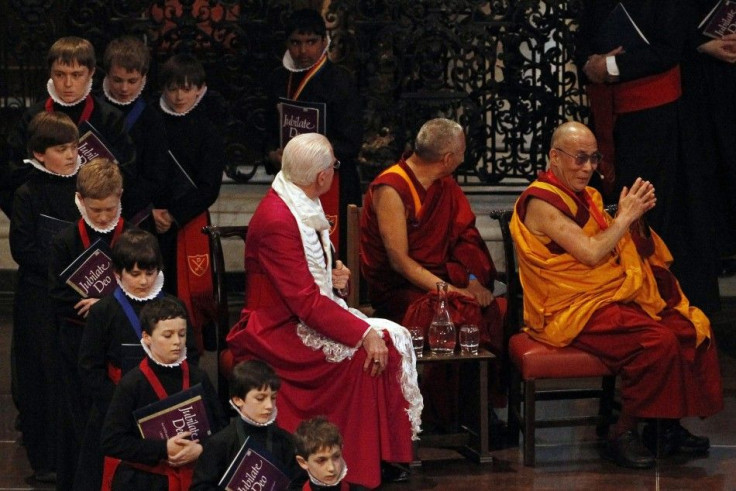China Denies 'Poison Plot' Against Dalai Lama As He Receives $1.7M Templeton Prize In London

China denied Monday allegations by the exiled Tibetan spiritual leader, the Dalai Lama, that it was plotting to assassinate him using poison and trained female agents posing as Buddhist pilgrims.
The Dalai Lama's claims were first reported on Saturday by British newspaper the Sunday Telegraph.
We received some sort of information from Tibet, the Dalai Lama told the Telegraph. Some Chinese agents training some Tibetans, especially women, you see, using poison -- the hair poisoned, and the scarf poisoned -- they were supposed to seek blessing from me, and my hand touch.
It is common for the Dalai Lama to place his hand on heads of religious followers as a blessing.
The Chinese Foreign Ministry did not respond directly to the Dalai Lama's accusation, saying it was not worth refuting, but made a general statement that it believes he often spreads false information.
The Dalai always wears religious clothes while carrying out anti-China separatist activities in the global community, spreading false information and deceiving the public, Foreign Ministry spokesperson Hong Lei said Monday, the Associated Press reported.
Chinese state-controlled tabloid the Global Times published an editorial Monday, blasting the Dalai Lama and denying the assassination plot, while suggesting that the Chinese government would have targeted him long ago if it truly wished to assassinate him.
If the central government wanted to 'eliminate' the Dalai Lama, why has it waited for such a long time? the Global Times wrote of the 76-year-old religious leader. Isn't it foolish to take action against Dalai at such an old age?
The paper also accused the Dalai Lama of trying to incite unrest in China among ethnic Tibetans in the runup to the Communist Party's 18th congress later this year, which will see the next generation of Chinese leaders transition into power.
The Dalai Lama has lived in exile along with other Tibetan political leaders in Dharamsala, India, since 1959, following a failed uprising against Chinese rule over Tibet. In March 2011, he resigned as head of the Tibetan government-in-exile, but remains the spiritual leader for many Tibetan expatriates and Tibetans within China.
'Entrepreneur of the Spirit'
The Chinese government's response to the Dalai Lama's assassination plot claim came as he appeared in London on Monday to receive the $1.7 million Templeton Prize presented to an individual who promotes spiritual understanding of life and between different faiths.
The Templeton Prize honors a living person who has made an exceptional contribution to affirming life's spiritual dimension, whether through insight, discovery, or practical works... [T]he prize aims... to identify 'entrepreneurs of the spirit'-- outstanding individuals who have devoted their talents to expanding our vision of human purpose and ultimate reality, reads a statement on the prize's website.
The Dalai Lama met with British Prime Minister David Cameron and Deputy Prime Minister Nick Clegg privately before accepting the prize.
China has typically denounced meetings between foreign leaders and the Dalai Lama, but has not responded to Monday's meeting.
The Dalai Lama said he would give $1.5 million of his prize money to the Save the Children foundation to help malnourished children in India, and $200,000 to the Mind and Life Institute, which promotes collaboration between science and spirituality, Agence France-Presse reported.
Our hope is with future generations, the Dalai Lama said of his first donation choice, according to AFP. Our generation belongs to the 20th century -- we are ready to say bye-bye.
© Copyright IBTimes 2025. All rights reserved.





















